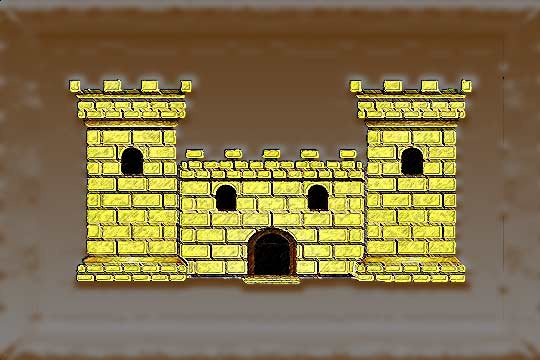Kalavarda, Rhodes, Dodecanese,South Aegean
Watchtower at cape Agios Minas
| Location: |
| At the cape Agios Minas on the coast north of the site of ancient Kameiros, in Rhodes |
| Region > Prefecture: |  |
| South Aegean Dodecanese | |
| Municipality > Town: | |
| City of Rhodes • Kalavarda | |
| Altitude: | |
| Zero Altitude |
| Time of Construction | Origin | |
| probably 15th cent. | IOANNITE |
|
| Castle Type | Condition | |
| Watchtower |
In Ruins
|
Ruins of a small round late-medieval watchtower of the Knights Hospitallers, part of the “chain” of coastal watchtowers protecting the island of Rhodes.
It is on Cape Agios Minas at the Rhodian west coast, a few meters from the shore, not far away from Ancient Kamiros.
Tower Description
Text: Dr. Michael Losse – Singen (Hohentwiel), Germany (17.12.2020)General description
Located a few meters from the shore, the ruin of the small round watchtower is hardly visible from the coastal road because of the two tavernas standing here. Not far away, on the spur of the site above, remnants of the ancient city of Kameiros were excavated.
The tower is listed in the British “Admiralty chart 1667” (1841), and the British researcher Charles Thomas Newton (1865) named it as a medieval tower. Shortly before, the German traveller, artist and researcher Albert Berg (1862, p. 108f) already mentioned “the sandy promontory of Hagios Minos, on the top of which stands a small Vígla, surrounded by the remnants of other medieval buildings [these are no longer visible today!]. Ancient debris and large masses of pottery sherds can also be found in the area” (original German text: “das sandige Vorgebirge Hagios Minos, auf dessen Spitze eine kleine Warte steht, umgeben von den Ueberresten anderer mittelalterlicher Gebäude. Auch antiker Schutt und grosse Massen von Thonscherben finden sich in der Gegend”).
The round tower (inside just under 3 m Ø) has a wall thickness of 0.8 m, its wall is up to 2.5 m high.
Researchers’ assessments that the tower was never much higher, justified with the lack of crash material and debris, is inconclusive, because in this region of the island which offers only a few stones that can be used as building materials, many historic buildings were “slaughtered” in search of building material. The quoted reference of Berg (1862) to the remains of “other medieval buildings” near the tower, which the archaeologist Prof. Ludwig Ross (1845) also mentioned, but which no longer exist, speaks for stone robbery.
Peter Lock (2006, p. 378) named the tower “Zaccópirgos”.
Access (route / entrance)
Next to the coastal road, located behind two Tavernas.
Free access.
History of the castle/tower
The tower was built during the Knights of St. John‘s (Hospitaller Knights‘) rule in the 15th century.
Other Info
SourcesLock, Peter: Freestanding towers in the countryside of Rhodes. In: Elizabeth Jeffreys (Ed.): Byzantine Style, Religion and Civilization. In honour of Sir Steven Runciman. Cambridge 2006, pp. 374-393.
Losse, Michael: Wacht- und Wohntürme aus der Zeit des Johanniter-Ordens (1307-1522) auf der Ägäis-Insel Rhódos (Griechenland). In: Burgen und Schlösser 4, 2009, pp. 245-261.
Losse, Michael: Die Burgen und Festungen des Johanniter-Ritterordens auf Rhódos und in der Ägäis (Griechenland) 1307-1522. (Publisher: Nünnerich-Asmus Verlag) Mainz 2017.
Losse, Michael: Die (Küsten-)Wachttürme des Johanniter-Ritterordens auf der Insel Rhódos (Dodekanes, Griechenland) bis 1522 – Zum aktuellen Forschungsstand. In: fortifikation. Fachblatt des Studienkreises für Internationales Festungs-, Militär- und Schutzbauwesen e.V. (INTERFEST), Vol. 34, 2020, pp. 59-90.
Newton, Charles T.: Travels and Discoveries in the Levant. London 1865 (Reprint: Hildesheim, Germany 1989), I, p. 236.
Ross, Ludwig: Reisen auf den griechischen Inseln des ägäischen Meeres. Dritter Band [= Vol. III]. Enthaltend Melos, Kimolos, Thera, Kasos, Karpathos, Rhodos, Chalke, Syme, Kos, Kalymnos, Ios (Reisen und Länderbeschreibungen in der älteren und neuesten Zeit, eine Sammlung der interessantesten Werke über Länder- und Staaten-Kunde, Geographie und Statistik, 31. Lieferung). Stuttgart und Tübingen 1845.
| First entry in Kastrologos: | December 2020 |
Sources
- Text and photographs (2008) by Dr. Michael Losse
|
|
| Access |
|---|
| Approach to the monument: |
| Next to the coastal road, located behind two Tavernas. |
| Entrance: |
| Free access |



